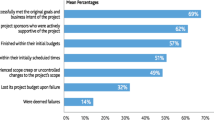Abstract
KPI (Key Process Indicators) are usually defined very early in the project’s life, when little details about the project are known. Moreover, the definition of KPI does not always follow a systematic and effective methodology. As a result, KPI and project success indicators are often defined in a rather generic and imprecise manner. We need to precisely define KPI and project success indicators, guarantee that the data upon which they are based can be effectively and efficiently measured, and assure that the computed indicators are adequate with respect to project objectives, and represent the viewpoints of all the involved stakeholders. In this paper a complete and coherent process for managing KPI and success indicators lifecycle is proposed. The process is instrumented by well integrated techniques and tools, including the Goal/Question/Metrics (GQM) method for the definition of measures and the R statistic language and environment for analyzing data and computing indicators. The proposed process was applied in the evaluation of the research project MUSES. The MUSES case study shows that the proposed process provides an easy and well supported path to the definition and implementation of effective KPI and project success indicators.
Access this chapter
Tax calculation will be finalised at checkout
Purchases are for personal use only
Similar content being viewed by others
References
MUSES project. https://www.musesproject.eu/
Basili, V., Weiss, D.: A methodology for collecting valid software engineering data. IEEE Trans. Softw. Eng. 10(6), 728–738 (1984)
Basili, V., Rombach, H.D.: The TAME project: towards improvement-oriented software environments. IEEE Trans. Softw. Eng. 14(6), 758–773 (1988)
Basili, V., Caldiera, G., Rombach, H.D.: Goal/Question/Metric paradigm. In: Marciniak, J.J. (ed.) Encyclopedia of Software Engineering, vol. 1. Wiley, New York (1994)
Fuggetta, A., Lavazza, L., Morasca, S., Cinti, S., Oldano, G., Orazi, E.: Applying G/Q/M in an industrial software factory. ACM Trans. Softw. Eng. Methodol. 7(4), 411–448 (1998)
Birk, A., van Solingen, R., Jarvinen, J.: Business impact, benefit, and cost of applying gqm in industry: an in-depth, long-term investigation at Schlumberger RPS. In: 5th International Symposium on Software Metrics (1998)
Birk, A., Hamann, D., Pfahl, D., Jrvinen, J., Oivo, M., Vierimaa, M., van Solingen, R.: The Role of GQM in the PROFES Improvement Methodology (1999)
van Solingen, R., Berghout, E.: Integrating goal-oriented measurement in industrial software engineering: industrial experiences with and additions to the Goal/Question/Metric method (GQM). In: 7th International Software Metrics Symposium (2001)
Lavazza, L.: Multi-scope evaluation of public administration initiatives in process automation. In: 5th European Conference on Information Management and Evaluation (2011)
Lavazza, L., Mauri, M.: Software process measurement in the real world: dealing with operating constraints. In: Wang, Q., Pfahl, D., Raffo, D.M., Wernick, P. (eds.) SPW/ProSim 2006. LNCS, vol. 3966, pp. 80–87. Springer, Heidelberg (2006)
Lavazza, L., Barresi, G.: Automated support for process-aware definition and execution of measurement plans. In: International Conference on Software Engineering (2005)
Likert, R.: Technique for the measure of attitudes. Arch. Psychol. 22(140), 1–55 (1932)
Brooke, J.: SUS: a “quick and dirty” usability scale. In: Jordan, P., Thomas, B., Weerdemeester, B. (eds.) Usability Evaluation in Industry. Taylor and Francis, London (1996)
Lewis, J.R., Sauro, J.: The factor structure of the system usability scale. In: Kurosu, M. (ed.) HCD 2009. LNCS, vol. 5619, pp. 94–103. Springer, Heidelberg (2009)
Venkatesh, V., Bala, H.: Technology acceptance model 3 and a research agenda on interventions. Decis. Sci. 39(2), 273–312 (2008)
Ripley, B., Lapsley, M.: Package RODBC - ODBC Database Access (2014)
Basili, V.: Applying the Goal/Question/Metric paradigm in the experience factory. In: 10th Annual CSR Workshop, Application of Software Metrics and Quality Assurance in Industry (1993)
Muench, J., Heidrich, J.: Software project control centers: concepts and approaches. J. Syst. Softw. 70(1), 3–19 (2004)
Nicho, M., Cusack, B.: A metrics generation model for measuring the control objectives of information systems audit. In: 40th Annual Hawaii International Conference on System Sciences (2007)
Park, R.E., Goethert, W.B., Florac, W.A.: Goal-Driven Software Measurement. A Guidebook. Software Engineering Inst., Carnegie-Mellon Univ. (1996)
ISACA: COBIT 5: A Business Framework for the Governance and Management of Enterprise IT (2012)
Tsunoda, M., Matsumura, T., Matsumoto, K.I.: Modeling software project monitoring with stakeholders. In: 9th International Conference on Computer & Information Science (2010)
Basili, V., Lindvall, M., Regardie, M., Seaman, C., Heidrich, J., Munch, J., Rombach, D., Trendowicz, A.: Linking software development and business strategy through measurement. Computer 43(4), 57–65 (2010)
Souza Cardoso, E.C.: Towards a methodology for goal-oriented enterprise management. In: Enterprise Distributed Object Computing Conference Workshops (2013)
Ihaka, R., Gentleman, R.: R: a language for data analysis and graphics. J. Comput. Graphical Stat. 5(3), 299–314 (1996)
The R Project for Statistical Computing. http://www.r-project.org
Acknowledgements
The work presented here was partly supported by the EU Collaborative project MUSES – Multiplatform USable Endpoint Security, under grant agreement n. 318508 and by project “Metodi, tecniche e strumenti per l’analisi, l’implementazione e la valutazione di sistemi software,” funded by Università degli Studi dell’Insubria.
Author information
Authors and Affiliations
Corresponding author
Editor information
Editors and Affiliations
Rights and permissions
Copyright information
© 2016 Springer International Publishing Switzerland
About this paper
Cite this paper
Lavazza, L., Frumento, E., Mazza, R. (2016). GQM-Based Definition and Evaluation of Software Project Success Indicators. In: Lorenz, P., Cardoso, J., Maciaszek, L., van Sinderen, M. (eds) Software Technologies. ICSOFT 2015. Communications in Computer and Information Science, vol 586. Springer, Cham. https://doi.org/10.1007/978-3-319-30142-6_13
Download citation
DOI: https://doi.org/10.1007/978-3-319-30142-6_13
Published:
Publisher Name: Springer, Cham
Print ISBN: 978-3-319-30141-9
Online ISBN: 978-3-319-30142-6
eBook Packages: Computer ScienceComputer Science (R0)




